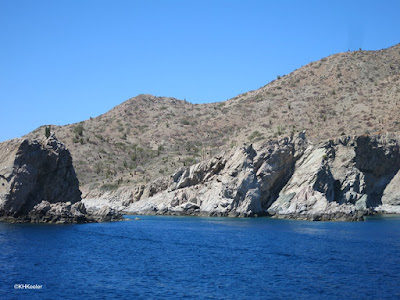A shimmer of white in my front yard: the serviceberry is flowering!
You might call it shadbush like my parents did, or saskatoon, as they do in Canada, or juneberry--the name you might see in the supermarket--or more regionally shadblow, sarvis or sarvisberry, sugarplum, wild-plum or chuckley pear.
All of these are names for native Amelanchier species, mainly A. alnifolia, though there are approximately 10 species native to North America (link: USDA plants)
Sunday, April 24, 2016
Monday, April 18, 2016
Visiting Baja California—Amazing Plants
 |
| island: Gulf of California |
From the moment I stepped out of the airport at San José del Cabo at the tip of the Baja California peninsula, the landscape was exotic:
The peninsula has a variety of climates, dry to extremely dry, hot to warm, some areas receiving summer rain, some with winter rain, all depending on exactly where you are. I saw only a sampling of it.
If you’ve been to the desert around Phoenix, Arizona, you’ve seen something like it. Deserts in this part of North America are very old. Baja California is in the core of this zone, with the most extreme, oldest desert and consequently with some of the strangest plants.
Sunday, April 10, 2016
Visiting Portland--Japanese Garden
 |
| a red camellia |
Sunday, April 3, 2016
Plant Story--Everybody Loves Narcissus and Daffodils
Daffodils!
The English called them daffodowndillies 400 years ago. The scientific name is Narcissus. Narcissus, daffodils, jonquils and paperwhites and whatever other names you know, they are all closely related.
They have been cultivated for hundreds of years, leading to diverse varieties and color forms now found all over the world.
Did you know they are poisonous?
The English called them daffodowndillies 400 years ago. The scientific name is Narcissus. Narcissus, daffodils, jonquils and paperwhites and whatever other names you know, they are all closely related.
They have been cultivated for hundreds of years, leading to diverse varieties and color forms now found all over the world.
Did you know they are poisonous?
Subscribe to:
Comments (Atom)


